Q&A Interview with BONES EP Stephen Nathan About 200th Episode + Potential Season 11
Mike Vicic - December 8, 2014
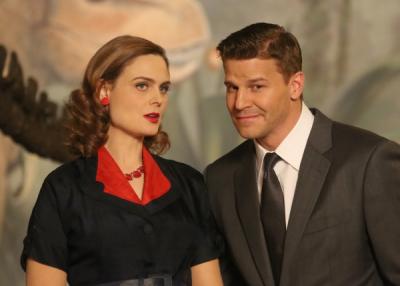
Earlier today, TV Tango participated in a conference call with BONES Executive Producer Stephen Nathan, who dished a few details about the show's 200th episode, reflected on the first 10 seasons of the show, and revealed encouraging signs for an eleventh season. We transcribed and edited the call, while also removing one or two minor spoilers about who appears in the 200th episode.
On Thursday, December 11, 2014 at 8pm ET/PT, FOX will premiere the "The 200th in the 10th" episode of BONES. In this milestone 200th episode, directed by David Boreanaz, BONES pays homage to Alfred Hitchcock in an episode that reimagines the Jeffersonian and FBI teams in 1950s Hollywood. Brennan plays an LAPD detective who's battling sexism on the force, and Booth is a notorious jewel thief who is far more than he seems to be. When Booth is framed for the murder of a rich socialite, he and Brennan team up to clear his name and find the true identity of the murderer.
|
|
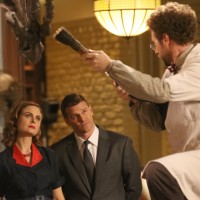 Photo Credit: Patrick McElhenney/FOX Photo Credit: Patrick McElhenney/FOX |
Question: How did you come up with the idea for concept for the 200th episode? How did you choose the roles characters would play? Stephen Nathan: Coming up conceptually with this, we wanted to go back to something that was classic, because after 10 years, we're kind of moving into the classic category. Not too many shows last for 200 episodes. I think there have been only 24 dramas in the history of television [that have lasted that long], from what I've been told. |
|
Stephen Nathan (continued): In terms of which characters played which parts, Booth and Brennan essentially are the same people in different specific roles, but Booth is still this honorable man who had been through the war, trying to right wrongs. Brennan is somebody who is stubbornly holding on to a set of beliefs that no one can shake from her, and she will be proven right in the end in this circumstance. |
|
|
|
|
|
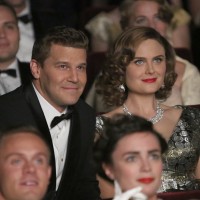 Photo Credit: Patrick McElhenney/FOX Photo Credit: Patrick McElhenney/FOX |
Question: Were there any films in particular that inspired you for this Hitchcock-themed episode? Stephen Nathan: Personally, I've always loved Hitchcock, so this was just a dream to do this style. The specific films? We kind of reference them -- mostly visually -- in this [episode]. It was TO CATCH A THIEF, NORTH BY NORTHWEST, bits of NOTORIOUS, THE MAN WHO KNEW TOO MUCH. We just really kind of culled the library of all these great Hitchcock films -- and also of the time -- to drop those little things in. What we didn't want to do -- and hopefully we avoided -- was just do an episode that was just a wink-and-a-nod to those things and also where the episode had to rely on costumes, props, and cars. What we tried to do was do another great BONES mystery and a story that existed and was sustained on its own merits, and it was cloaked in the style. I think we did that. David Boreanaz did a remarkable job directing this, and really carried forth this vision that the story was the most important thing. We wanted the audience to go, "Well, who did it? Oh my god, that's an interesting twist!" rather than "Oh, there's another car. Look at their clothes now." I think David really directed this walking that fine line perfectly -- that's the reason why I think this works so well. |
|
|
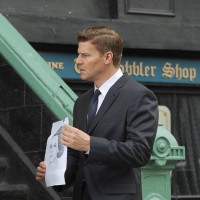 Photo Credit: Patrick McElhenney/FOX Photo Credit: Patrick McElhenney/FOX |
Question: Why did you decide to let the characters drink but not smoke in this episode? Stephen Nathan: The network doesn't like smoking, and certain things have changed since 1954. In 1954, there were ads about the benefits of smoking, where you saw doctors tell you that it was good to smoke. I think we wanted to get away from that. It would've been nice to have someone smoking, but it really wasn't that necessary. I think that time was really more about, at least for us, knocking back some dry martinis rather than trying to contract lung cancer. |
|
|
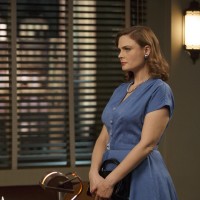 Photo Credit: Patrick McElhenney/FOX Photo Credit: Patrick McElhenney/FOX |
Question: Can you talk about the work the crew did for this episode? Stephen Nathan: This was by far the most difficult episode BONES has ever done. It was a massive, massive undertaking. We've had earthquakes in the subway system of Washington D.C., tornadoes, and we shot up the house, but nothing -- nothing -- compared to this episode. In the middle of a season, to do an episode this enormous, this complex and this exacting -- and requiring this much care and detail -- it's really just incomprehensible that it got done at all. And every department on BONES. This episode shows how brilliant this entire cast and crew are. The art department -- Val Wilt, who's the production designer; Megan [Malley-Cannon], his art director. Everybody. It was spot on. Wardrobe, it was Robin [Lewis West]. Every single person. Props...going all the way down to Greg Collier, who's our DP, who got the color just right and lit this in a different way. And then going into color timing, and people behind the scenes who do the sound mix. Sean Callery, our brilliant brilliant composer, who found a way to be true to the music of the time and yet still have the style that is our show. It's just a remarkable achievement from every single department. If you didn't start in the beginning, you could be looking at this thinking, "Oh, I've never seen this movie before. What is this movie?" It is so precise and exacting, the detailed work that went into this episode. I have nothing but highest praise, admiration, respect and realy awe for the crew and how they pulled this off. |
|
Question: Can you talk about the opening credits and the role of the network and studio for this show? Stephen Nathan: The truth is the network and studio were fantastic. They were supportive and on board for the whole thing. They loved the concept and were as happy to be part of this as we were. |
|
|
|
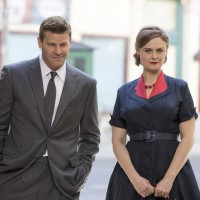 Photo Credit: Patrick McElhenney/FOX Photo Credit: Patrick McElhenney/FOX |
Question: Can you talk about how the writing and acting were different in this episode? Stephen Nathan: We wrote it like those films. I know those films quite well. It's like music. It's writing a song today and writing a song that was written in the '40s or '50s. There's a different music to it; there's a different music to the dialogue, to the rhythms, to the types of words, the cadence, everything. We just did our best to capture that. David and I talked for quite a while -- although David got it right away -- that this couldn't be a SATURDAY NIGHT LIVE sketch of a Hitchcock movie or any movie from 1954, because that would become tedious in about two minutes. David understood that this had to be done with the same sense of truth that's required to do any BONES episode. We just tried to write it so the rhythms were there, the dialogue was there, and the slang was appropriate, and then the actors just got it. Emily's rhythms, the ever-so-slight turn of her accent -- everybody found the same reality, and it just worked great. |
|
Stephen Nathan: They just had a fabulous time. They're actors, and they got to be in the same show playing different characters with different clothes. It was just so much fun for everybody. Everyone know it in their -- I hate to say it -- knew it in their bones or had done research, and just relished playing this new style. |
|
|
|
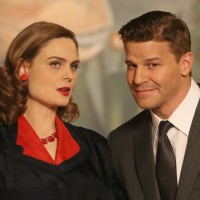 Photo Credit: Patrick McElhenney/FOX Photo Credit: Patrick McElhenney/FOX |
Question: Do you do these one-off episodes each season to keep the actors fresh? Stephen Nathan: I don't know if we have any ulterior motive or anything like that. |
|
Stephen Nathan (continued): Those other episodes -- whether we do the entire show from the viewpoint of the skull of a dead person or whether it's the 200th episode where it's 1954 or we do dreams or Stewie's in an episode -- I think are all part of this odd little BONES world, which just keeps going on and on and on. We don't really sit down and say, "Let's do a really weird one now," because we need to, we just kind of go, "Hey, we got an idea for a weird one. Let's do it." We just kind of do it. |
|
|
|
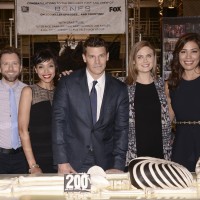 Photo Credit: Dan Steinberg/PictureGroup for FOX Photo Credit: Dan Steinberg/PictureGroup for FOX |
Question: Do you have any word on an eleventh season yet? Stephen Nathan: We certainly have been talking about an eleventh season. We're ready to do whatever the network tells us to do. It's all up to the network. The network and studio have to get together to decide whether there will be an eleventh season. All indications are that there probably will be, but you never know until you know for a fact. We're just going to keep moving forward. Hart and I have talked about this before, and if we have to end it, we'll end it, but it does not seem as if it's ready to end. |
|
Question: How does it feel to still be going strong after ten seasons? Stephen Nathan: It's remarkable. It's one in a million. It just doesn't happen. I've been doing this for a long long long time, and I've never come close to ten years. Ten seasons in the beginning was an inconceivable thought. When we started with the first 13 [episodes], we didn't know if we could have enough stories where we could be solving murders using bones, and here we are 200 episodes later still doing it and still finding new things. I don't even know how that happens. |
|
|
|
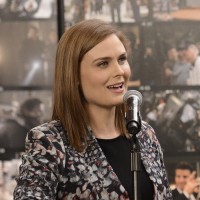 Photo Credit: Dan Steinberg/PictureGroup for FOX Photo Credit: Dan Steinberg/PictureGroup for FOX |
Question: Will you write Emily's pregnancy into the show? Stephen Nathan: We're still talking about that. It's very difficult to hide a pregnancy. We could have her behind desks and drawers and things like that, but I think people know. The show is as much about their relationship as it is about solving crimes. This is what happens to people in relationships. Married people who have children sometimes have more children. It's served us very well before, and I think it will be an interesting new wrinkle in the show going forward. I know there will be people who violently disagree, "Oh no! I didn't like the baby before," but there are people who always disagree and others who agree. It's a lot like life. There are many many different twists and turns in people's lives, and some people watching those from the outside like some and dislike others. The ones that are disliked by them are liked by others and vice versa, so we just have to keep going forward in way that's seems truthful to us and hopefully enticing and enjoyable for the audience. That's our job. As much as we listen to the fans, we can't be ruled by the fans. We can only love the fans. |
|
|
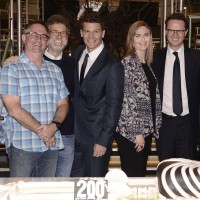 Photo Credit: Dan Steinberg/PictureGroup for FOX Photo Credit: Dan Steinberg/PictureGroup for FOX |
Question: How is the show different to write in the tenth season compared to Season 1? How do you keep stories fresh? Stephen Nathan: I don't know. I don't have any idea. We just keep finding worlds that we haven't explored before. We just have a remarkable group of writers, led by John Collier, who continually come up with new and unique stories and worlds and science. The one thing we have going for us is that in the past ten years science has really done a lot of good new stuff, and we get to take advantage of all of that. The forensic world is changing and allowing us to look at our crimes in a different way. And if we're open to the relationships as living, breathing things, the relationships take us in new places that we haven't seen before and just keep having a life of their own. It's kind of staying open and not trying to keep this show in a box, and I think that's why oftentimes you don't really know what the h#ll you're going to see on show. You don't know whether you're going to be laughing or if you're going to need a box of Kleenex. As long as we can keep that going, I think the show has a tremendous amount of life still left in it. |
|
|
